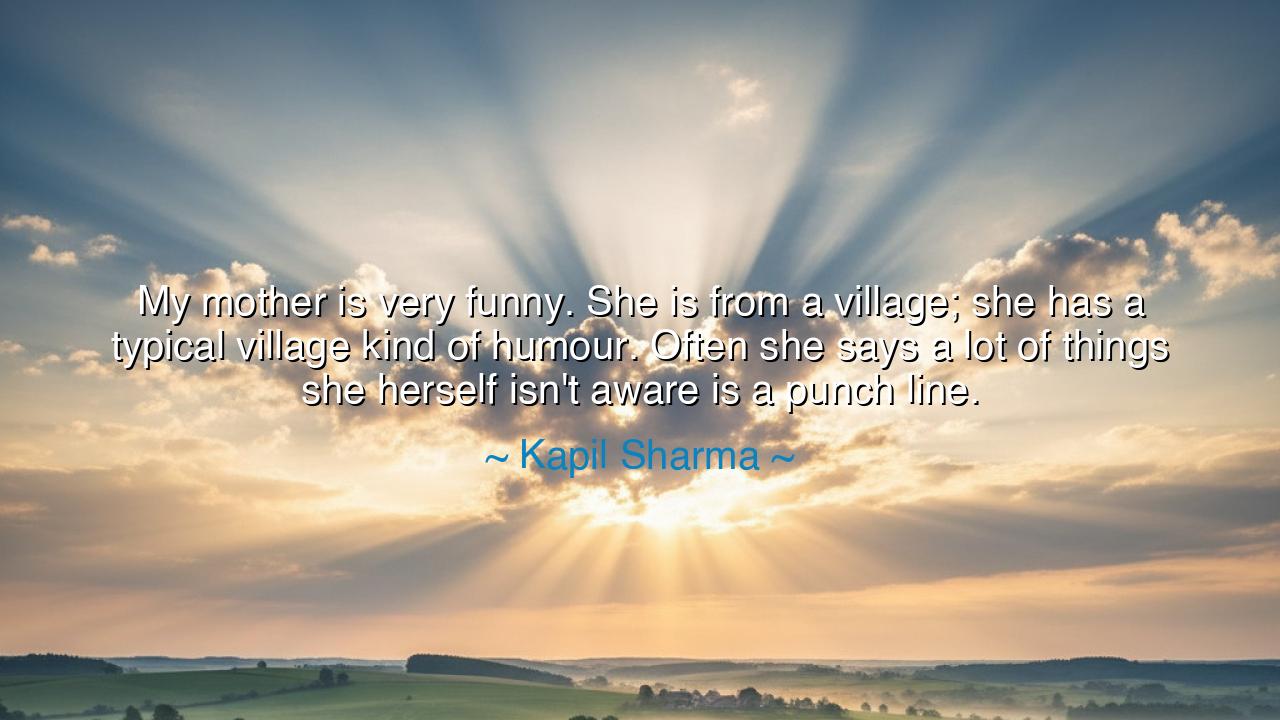
My mother is very funny. She is from a village; she has a typical
My mother is very funny. She is from a village; she has a typical village kind of humour. Often she says a lot of things she herself isn't aware is a punch line.






The words of Kapil Sharma, “My mother is very funny. She is from a village; she has a typical village kind of humour. Often she says a lot of things she herself isn’t aware is a punch line,” speak not only of laughter but of innocence, simplicity, and the divine spark of untrained wisdom. Beneath these humble words lies a truth the ancients often sang of—that wisdom and wit do not belong only to the learned or the powerful, but are scattered like wildflowers among the hearts of simple folk. The humour of the village, like the laughter of children, arises not from craft but from the purity of perception. It is truth unclothed, wisdom unpolished, and joy unforced.
In this quote, Kapil Sharma honours his mother, the eternal archetype of nurturer and teacher, whose words—though unintended as comedy—carry the laughter of life itself. Her village humour is the laughter of authenticity, untouched by vanity or pretense. She does not strive to be witty, and therein lies her beauty. The ancients knew this well: that true laughter springs not from cunning but from clarity, not from effort but from being. The simple heart, unburdened by sophistication, sees the world in a way that makes even sorrow bearable.
Consider the tale of Diogenes the Cynic, that ragged philosopher who lived in a barrel. When Alexander the Great came to visit him, expecting reverence, Diogenes merely said, “Stand out of my sunlight.” The king, taken aback, laughed—not at insult, but at truth disguised as humour. Like Kapil’s mother, Diogenes did not intend a punch line—his words simply were. The great laughed because the simplicity cut through illusion. Such is the nature of innocent humour—it is not crafted, it is revealed. It rises from the soul, not from the stage.
The village that Kapil speaks of is more than a place—it is a state of being. It is the home of unaffected truth, where language dances with the rhythm of daily life, where jokes and wisdom are sown together like seeds in one field. His mother’s humour comes from that soil, rich with honesty and unselfconsciousness. She does not measure her words; she simply speaks, and life itself becomes the jest. In that effortless mirth lies a reflection of something ancient and sacred—the laughter of the earth itself.
We live now in an age of noise, where cleverness is rehearsed, and jokes are honed like weapons. Yet the village laughter remains untouched—a reminder that the truest humour is born not of intelligence but of presence. It is the laughter that flows from someone who does not know she is being funny, because her eyes still see the wonder and absurdity of life without disguise. Such laughter heals, for it carries no malice, no performance—only life in its pure, unfiltered truth.
From this, we may draw a lesson for our own lives. Let us not seek always to be the most polished or witty; instead, let us be authentic. Speak from the heart, and the world will find its own laughter in your honesty. The wise man of the mountains once said, “The joke is not in the tongue but in the soul.” If your heart is open, your presence will bring lightness to others without effort. Be simple, be real, and you will become the source of joy.
So, my friends, remember the humour of the village—the laughter of mothers, of grandmothers, of the old men by the well. Their jokes were not written in books, yet they carried the wisdom of centuries. Their laughter bound communities, softened hardships, and turned pain into poetry. Seek that laughter again. Sit among those who laugh without knowing why. Let their innocence wash over your weary mind.
For in the end, the teaching of Kapil Sharma’s words is this: true humour is divine simplicity. The mother who laughs without intent is the teacher who shows us how to live without guile. The village, with all its earthiness, reminds us that joy does not need permission, polish, or planning—it simply is. Let us return to that way of being, where laughter blooms naturally, and in our ordinary words, the extraordinary shines.






AAdministratorAdministrator
Welcome, honored guests. Please leave a comment, we will respond soon